Summer 2018
Published: 06/12/2018
Letter from the Chair
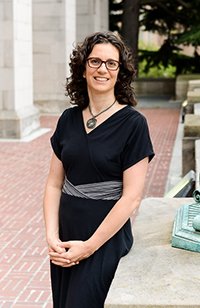 |
Psychology’s spring commencement was a fantastic celebration of the achievements of our 502 graduating seniors. This has been an incredible year for Psychology undergraduates, as our majors are the recipients of UW’s highest honors, including the Sophomore Medal, the Aker’s Scholarship, the Bonderman Fellowship, the Husky 100 Award, and Grace Woodard, one of our graduating seniors, was honored at the university-wide commencement ceremony as the President’s Medalist. We are so proud of the Class of 2018, and look forward to their accomplishments in the next stage of their lives.
Spring also brings our beloved hooding ceremony, where we honored Psychology’s newly minted PhD’s. Our graduate students will move onto prestigious postdoctoral fellowships and faculty positions, will transform industry and government, and will bring evidence-based practices into therapeutic contexts. Our graduate students are central to our department’s teaching and research mission, and their scholarship and discoveries are at the cutting edge of psychological science. This spring, Mary Lou Hunt, widow of Earl “Buz” Hunt, who was a distinguished faculty member and chair of our department, met with several of our graduate students, and saw how her families’ endowment provides opportunities for our students to follow their intellectual passion. You can learn more about our graduate students in this newsletter.
This year we connected our scholarship with the broader community in many ways, including lab tours and our exceptionally well-attended annual Allen Edwards Public Lecture Series. Our faculty continue to bring great honor to our university with their research, and they are the recipients of prestigious awards and grant funding. This year was particularly special as Associate Professor Kristina Olson received the Waterman Award, the nation’s highest honor for scientists under 40. She is the first UW recipient of this award in it’s over 40 year history. You can learn more about our talented faculty elsewhere in this newsletter.
This academic year was also a time of change for Psychology. We saw Drs. Jaime Diaz and John Miyamoto, two of our long-serving faculty, retire. We wish them the best. We also watched the Gates-funded Population Health Facility break new ground on what was formerly our beloved Guthrie Annexes that housed our graduate training clinic and many of our faculty labs. Our ultimate goal is to bring our department together in a single, state-of-the art facility that is designed to support integrated and collaborative research and training. Please reach out with your ideas for how to create opportunities for Psychology to ultimately realize our vision and reside in space that honors the world class contributions our students and faculty make to the UW, science, and society.
Thank you to our supporters for keeping Psychology thriving amidst challenging times in our federal and state budgets. Our student endowments, which delivered nearly $100,000 this year, represent a vital investment in the future of Psychology. Few opportunities are more special than informing talented students that they are receiving support for their educational expenses, or conference travel to present their first research project.
As we enter the long and glorious days of Seattle summer, we wish you well and hope you will keep in touch.
All the best,
Cheryl R. Kaiser
Professor & Chair
Featured Articles
Faculty Spotlight: Kristina Olson wins the NSF Alan T. Waterman Award
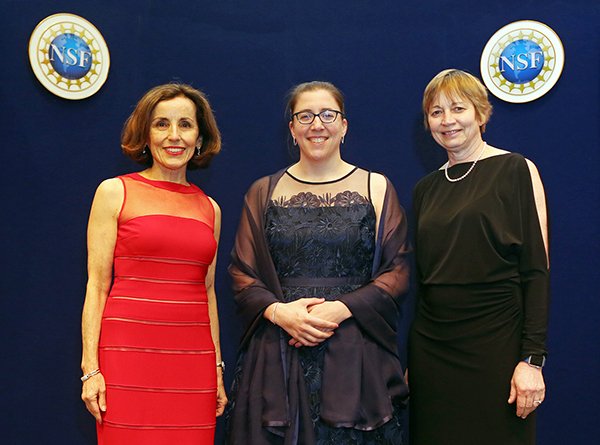 |
| France Cordova, Kristina Olson, and Maria Zuber Photo: NSF/Rich Riggins |
Recently the National Science Foundation (NSF) awarded UW psychologist Kristina Olson the 2018 Alan T. Waterman Award, which is the nation's highest honor for early career scientists. Professor Olson was recognized for her innovative contributions to understanding children's attitudes toward and identification with social groups, early prosocial behavior, the development of notions of fairness, morality, inequality and the emergence of social biases. Kristina Olson is the first psychologist to receive the Waterman Award and the first woman since 2004 to receive the honor. As part of the award, Professor Olson will receive a five-year, $1 million research grant. We recently asked Professor Olson how she felt about receiving the prestigious NSF Alan T. Waterman Award:
1) What does it mean to you personally receiving the NSF Alan T. Waterman Award?
I am surprised, humbled, and honored to receive the Waterman Award. It meant a lot to me because I know that winning the award is a reflection of the amazing team of mentors, students, and colleagues that I've had a chance to work with over the last decade.
2) You are the first psychologist to ever receive the Waterman Award. What are your thoughts about NSF recognizing your work in psychology?
To be the first psychologist to win it is exciting, but mostly makes me want to represent the field well. While in DC I had to give several talks and I tried to focus on the contributions of the broader field of psychology because I know that so many people are doing such important work, not just me. I think it is wonderful that NSF and the National Science Board are increasingly recognizing the critical role of psychology in the nation's science agenda.
3) How do you think this award will impact your current research?
This award will allow me to try out some riskier ideas and move my work in some new directions. For example, I'm hoping to use this as an opportunity to learn more about intersex children's gender development. These are individuals whose sex at birth is not clear - they cannot be easily categorized as male at birth or female at birth. I'm also excited to use some of the money to start a summer internship program. The best way to improve scientific research, in my opinion, is to increase the number of people who are doing scientific research. I hope the internship can help assure that we have the best pool of future psychological scientists around!
4) What is the mission of your current TransYouth Project?
The TransYouth Project is the first large, national, longitudinal study of transgender children. These are children who are living as a gender that does not align with their sex at birth. It started when I arrived at UW because I realized we had a lot to learn about gender and general human development from this unique cohort of children. This project allows us to gain insight into the lives of transgender children as well as understand the contributors to mental health and well-being.
President's Medalist: Grace Woodard
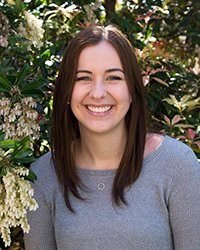 |
| Grace Woodard |
"I am completely indebted to the women in my research lab who challenged me, supported me, and befriended me. Not only are they all amazing female scientists, but they are mothers, friends, partners, and wives, which inspired me to pursue my Ph.D. knowing it is possible to maintain a healthy personal life and be a scientist."
- Grace Woodard, Graduating Senior in Psychology and 2018 President's Medalist
Growing up in Eastern Washington, Grace Woodard notes that it was not always easy to be a Husky fan. Thankfully, Grace's father, a UW alumnus, not only taught her to be a fan of the Dawgs but, as her high school AP Psychology teacher, helped to ignite her passion for the discipline. Fast forward to the present and Grace is doing her father and her department proud as she was recently awarded the President's Medal. This award is presented annually by the UW President to two graduating seniors who have achieved the most distinguished academic records in their class. Grace is only the third Psychology major recipient of the award since it was first given in 1932 (others were in 1951 and 2004).
In addition to finding inspiration from her father's class, Grace's interest was sparked by the role she played as a caregiver to a young cousin who was being fostered by Grace's family. "I dove into the world of developmental psychology, child resilience, and trauma exposure in order to help her as best I could," recalls Grace, "and I knew that I wanted to attend a school with a world-renowned Psychology department to study trauma exposure and resilience to honor my little cousin." As a UW freshman, a Facebook post seeking student research assistants caught Grace's attention. The following two and a half years would see Grace engaged in honors research with the UW Center for Anxiety and Traumatic Stress, directed by Psychology Professor Dr. Lori Zoellner.
Along with her honors research project, Grace has engaged in a number of volunteer, internship, and leadership positions both on and off campus. She has served as a members of the ASUW Mental Health Working Group, a member of the First Year Programs Advisory Board, and a Peer Mentor in the UW Interdisciplinary Honors Program. Off campus, Grace volunteered as a tutor/mentor at Garfield High School, working with aspiring first generation college students, with the charity Construction for Change, which focuses on maternal health around the world, and held a competitive internship at Seattle Children's Hospital. She has also taken on a number of leadership roles both within her sorority and the greater Panhellenic Association.
Grace advises future Psychology majors to seek out opportunities and jump on them when they present themselves. "While you learn so much from professors and TAs," says Grace, "experience is the only way to test the value of your knowledge in the real world." Grace plans to work in the field of research and mental health for the coming two years prior to beginning a Ph.D. program in Clinical Psychology.
Read more about Grace's President's Medal here.
Developmental and Clinical Student Wins Prestigious NSF Fellowship
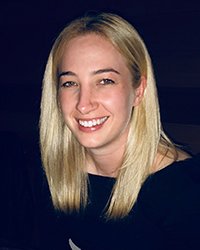 |
| Lily Durwood |
The National Science Foundation's Graduate Research Fellowship Program (GRFP) is highly competitive and provides fellowship support for graduate students (master or doctoral) in science, technology, engineering, and mathematics. Recipients are given a three-year award consisting of a fellowship stipend and an education allowance, in addition to the powerful networking opportunities and resources afforded by being selected as a fellow.
The Department of Psychology is fortunate to have several NSF fellows in our graduate program. Lily Durwood, a second year student in Child Clinical with Drs. Kristina Olson and Kate McLaughlin, is our most recent recipient of this prestigious fellowship.
Where are you from and where did you complete your undergrad?
I grew up in San Diego, California, and I completed my undergrad at Harvard in Psychology with a minor in Studies of Women, Gender, and Sexuality.
How did you wind up at UW?
I’ve been in Seattle since 2010. I moved here right after college when I got a job working in HR at Microsoft. After five years at Microsoft, I decided I wanted to return to Psychology, so I came to UW first as a staff member in two labs and then as a graduate student in 2016. I applied to UW because the clinical training is incredible here and because UW is the home of a huge longitudinal study, the TransYouth Project, that is focused on the population that I am interested in, transgender kids. I also really wanted to work with my two advisors, Drs. Kristina Olson and Kate McLaughlin.
What is your research interest and how did you get into it?
I’m interested in figuring out what families should do when they have a young child who may identify as transgender. I became interested in the topic when I was in college and I saw an episode of 20/20 about a transgender child and subsequently learned how little research exists to support families in this situation.
The name of my NSF-funded project is Concealing an Identity in Hostile vs. Accepting Environments.
How might your research change the world?
Well, I’m not sure if my research will change the ENTIRE world, but I think it will have large implications for a small group of people. Like I said, I’m interested in figuring out what families should do when they have a young child who might identify as transgender. Right now, these families have very little research that can inform a host of decisions they face on how to best support their child (e.g., Should they let their child live as transgender? Does that decision depend on how accepting vs. hostile their child’s social environment is? If the child lives as transgender, should he or she be open about that at school, with friends, etc., or will that be harmful because it will expose them to more bullying and discrimination, etc.? And so on.).
Do you have any advice/tips/suggestions for others who may apply to this opportunity? About graduate study in general?
It was helpful for me to start thinking about my research idea very early (maybe 6 months before the application was due), and I also got feedback from my advisors on the idea very early on as well. That gave me the chance to work on the proposal in a leisurely(ish) way throughout the summer, and I had time to think between drafts. When I applied two years ago and didn’t get the award, I started working on a proposal 24/7 about six weeks before it was due. I think giving myself more lead time and working on it little-by-little was a better strategy for me. On the other hand, my friend Trent has an NSF also and I think he wrote his in a month or two—so maybe it depends on the person.
If you plan to apply for an NSF, I’d recommend reaching out to someone who has applied for one before and is willing to share their materials with you (feel free to email me!). Whether or not you receive the grant, the reviewers give you feedback on your application, and it’s very helpful to read about the kinds of things that reviewers care about. For example, I know from many comments I’ve read that reviewers care a lot about the broader impacts of your research.
What do you hope to accomplish with this funding?
The NSF will give me a lot more time to devote to answering the research questions I mentioned before. To do that, I’ll be flying around the country a lot with other members of my lab to meet with families in our study, and then I’ll be writing up the results, of course! In terms of clinical training, one big goal of mine is to figure out how to explain the research that currently exists in the field to families in a way that makes sense.
Supplemental Reading:
- Several graduate students have been featured in past issues for their NSF awards, Trent DesChamps, Linda Zou, Kelsey McCune, Arianne Eason, Laura Brady, Teri Kirby, and Bjorn Hubert-Wallander.
- More information on the GRFP can be found online.
- Assistance in applying to the NSF is provided by the UW Graduate School Fellowships and Assistantships Office.
- Grants and Funding Information Service (GFIS) through the UW Libraries.
Alumni Who Give Back: Shihfen Tu and Craig Mason
Shihfen Tu and Craig Mason met on their first day of graduate school with the University of Washington Department of Psychology in the fall of 1987. As partners in life, work, and philanthropy, they have gone on to have a meaningful impact in both the field of Psychology and by giving back to the University of Washington.
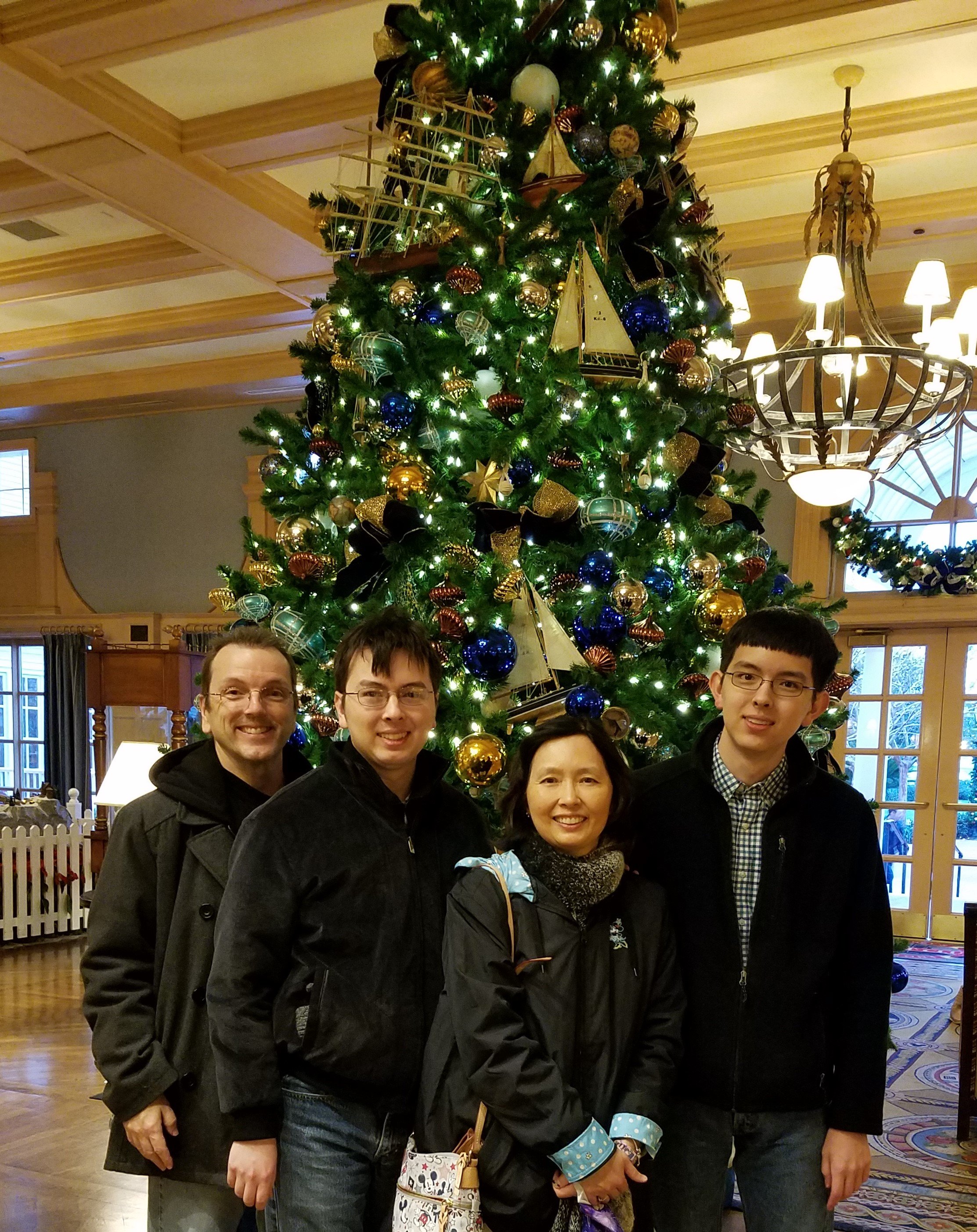 |
| Craig, Shihfen, and their sons |
Shihfen and Craig began their graduate studies in the areas of Cognition & Perception and Child Clinical Psychology, respectively. However, the training they received was instrumental in both their careers following graduate school as they grew in new directions: now both faculty members at University of Maine, Craig and Shihfen study developmental epidemiology, making advances in how we view children’s health and development. Craig shares that although they received training in particular areas of Psychology, their UW experience “provided insight into education and epidemiology, and into principles of learning and brain development, that other fields simply don’t have”. The broad research methodology background that they gained as graduate students have launched them into these exciting new spaces that they would not have been able to explore otherwise.
Now, Craig and Shihfen show their appreciation to the university that has given them so much, through philanthropic gifts. As regular donors to the Psychology Department for over two decades, the couple has supported Psychology graduate student fellowships, research initiatives, and more. They give to the University of Washington Psychology Department to “continue to support the next generation of students in the ways [they] were supported during graduate school, and to show appreciation for the department and faculty who trained [them]”. Moreover, they’re proud of the strong, respected reputation of their alma mater and want to do their part to maintain it by helping the department recruit and retain top faculty and students – something made possible by gifts to a discretionary fund like Friends of Psychology. And, they say, they owe this invaluable experience to their faculty advisors that guided them through their graduate school journey. Shihfen’s advisor was Professor John Miyamoto, and Craig’s advisor was current UW President Ana Mari Cauce. Both Craig and Shihfen “credit [their] advisors with absolutely everything that [they] have achieved. Professors Cauce and Miyamoto were very influential and supportive and endlessly committed to helping their students. The training [they] received from these professors was world-class”. Shihfen and Craig emphasize that the positive, encouraging relationships they had with faculty have shaped how they interact with their own students as professors today.
We thank Shihfen and Craig for their outstanding commitment to supporting Psychology students through their philanthropic gifts. It is because of alumni like them that the department can provide the same transformative educational experience that they received as graduate students.
If you would like to join Shihfen and Craig in investing in the life-changing impact that a UW Psychology education has on our students, we invite you to pledge a gift today.